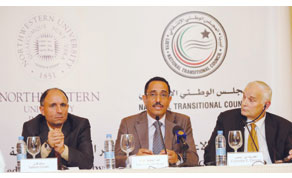 |
| Salem Gnan, Abdulhafeedh Ghoga and Everett E Dennis at a press conference yesterday |
A government-led Libyan delegation concluded the “Media Vision for Libya: A Good Offices Conference,” which was hosted by Northwestern University in Qatar (NU-Q), by announcing a consensus on principles and action items for recommendation to the National Transitional Council (NTC). Those principles and action items, which address four main pillars that include governance, media economy, technological change, and education training, will be expanded into a full report to be published in 2012.
“After four decades of autocratic rule, Libya is now in a position to create an independent, national media system that meets the needs of its people,” said Abdulhafeedh Ghoga, NTC vice chairman , and the conference co-chair and head of the Libyan delegation. “These principles and action items will serve as guideposts as we seek to put in place the type of media environment required by a vibrant, modern state.”
“The Libyan delegation has taken a very important first step toward deciding what type of media system they want for their nation,” said Everett E Dennis, dean and CEO of NU-Q, and the conference chairman.
The participants agreed that Libya should have a free, open and independent media and communications system. Also, private media should be permitted and encouraged.
The state regulator should become an independent regulator to direct technical, structural, and spectrum regulation, as well as to promote development of broadcasting and telecommunication services.
Control of content should be limited. Any limitations should be enacted by the parliament and adjudicated by an independent judiciary.
State media should be transformed into independent media operated as a public service trust and/or privatised. Further, there should be a robust system for media literacy and journalism education and training.
Recognising the need for action in the interim period and realities on the ground, the group recommended that the NTC should promote and discuss these principles through a series of public forums and debates. It should also create a vehicle to ensure that the principles are embodied in the constitution and future legislation.
A consultative council of experts to advise on the advancement these principles should be established. Inventory and assessment of the existing state media and communications infrastructure have to be conducted. Temporary operating authority should be granted to the existing broadcasters and electronic media, until an independent regulator is established. Journalism organisations should create a code of ethics for the Libyan media.
The Libyan delegation included Salem Gnan, NTC member for Nalut, in addition to leading figures from academia, media, government, journalism, local councils and legal organisations. The delegation members were all active figures in the revolution, and represented a diversity of Libyan regions and society.
Outside expert participants included leading media economist Dr Robert Picard, director of research at the Reuters Institute, Oxford University, technology policy expert Dr Robert Pepper, head of Government Affairs at Cisco Systems, and Joyce Barnathan, president of the International Center for Journalists.
The secretary general of the Arab League, Nabil al-Arabi, attended the opening session and gave keynote remarks on the importance of a free and independent media.
Under the “good offices” structure, NU-Q acted as an impartial third party in organising the conference.

